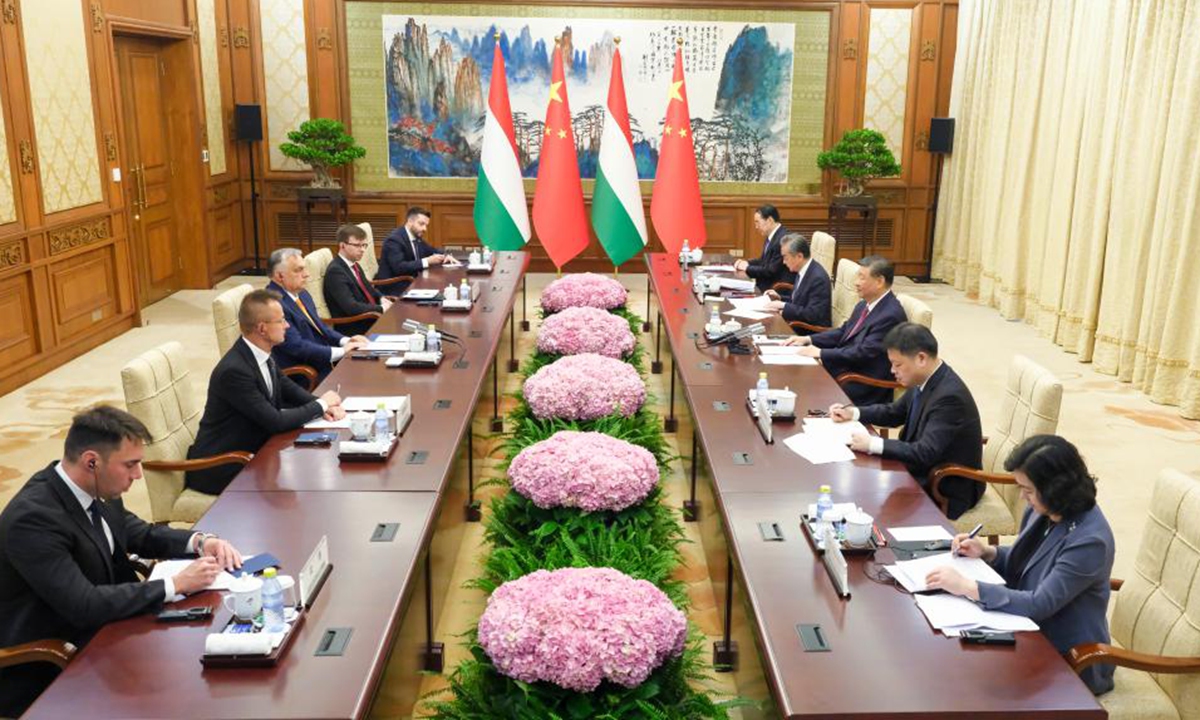
Chinese President Xi Jinping meets with Hungary's Prime Minister Viktor Orban at the Diaoyutai State Guesthouse in Beijing, capital of China, July 8, 2024. Photo:Xinhua
Chinese President Xi Jinping met with Hungary's Prime Minister Viktor Orban at the Diaoyutai State Guesthouse in Beijing on Monday morning. During the meeting, President Xi and Prime Minister Orban exchanged views on bilateral relations, China-EU relations and other issues of common concern. The two sides focused on in-depth communication on the Ukraine crisis. This is another high-level dialogue between the two after President Xi's state visit to Hungary in May. It is of great significance to China-Hungary relations, China-EU relations and the consensus on promoting a political solution to the Ukraine crisis.
Many have noticed that Orban's visit to China is quite "unexpected." It is the third stop in the "whirlwind tour of diplomacy" after Hungary took over the European Union's rotating presidency. In recent years, Hungary has resisted the actions of pan-politicization of cooperation with China within Europe and insisted on proceeding from practical bilateral interests and overall picture to promote China-Hungary cooperation in industrial fields such as electric vehicles (EVs), infrastructure construction including the Budapest-Belgrade railway, green finance, digital finance and other technological and cultural fields. China-Hungary relations have entered the best period in history, embarking on a "golden voyage." This "unexpected visit" first reflects the high level of political mutual trust and strategic communication and coordination in China-Hungary relations, which will inject new impetus into the continued deepening of bilateral relations.
As Hungary holds the EU's rotating presidency, this visit will also help China and the EU resolve misunderstandings and differences through close communication and dialogue, creating an atmosphere of mutual trust between the two parties. For some time, China-EU relations have faced tensions and challenges due to issues such as tariffs on EVs.
However, there are no geopolitical conflicts or fundamental interests conflicts between China and Europe, and this "foundation" has not changed. The key is whether Europe can maintain the correct positioning of being a partner to China and the mainstream tone of cooperation. From this perspective, Orban, who has always held a practical cooperation stance toward China, is expected to use this visit as an opportunity to create more space for dialogue and communication between China and Europe, and bring new opportunities and possibilities for cooperation between China and Europe in this special period.
The Ukraine crisis, as the "theme" of Orban's whirlwind visit, was the focus of communication between the two sides this time.
Orban briefed the Chinese side on the recent visits to Ukraine and Russia. President Xi expressed appreciation for Orban's efforts in promoting the political settlement of the Ukraine crisis, and also stated that the basic propositions of China and Hungary and the direction of their efforts are the same. President Xi emphasized that the current focus is observing the three principles of no expansion of the battlefield, no escalation of fighting, and no fanning by any party over the flames, and called on the international community to create conditions and provide support for the resumption of direct dialogue and negotiation between the two sides.
The Chinese side has consistently advocated for peace and dialogue in the Ukraine crisis, encouraging and supporting initiatives and efforts that contribute to easing tensions and achieving peace around the world. China has also been playing a positive role in promoting peace through its own means. This year, Member of the Political Bureau of the CPC Central Committee and Foreign Minister Wang Yi met with Ukrainian Foreign Minister Dmytro Kuleba, Chinese Vice Foreign Minister Sun Weidong met with Ambassador of Ukraine to China Pavlo Riabikin, and held a consultation with Ukraine's First Deputy Foreign Minister Andrii Sybiha. Li Hui, the special representative of the Chinese government on Eurasian affairs, conducted the second and third rounds of shuttle diplomacy on the Ukraine crisis. In May, China and Brazil jointly issued a six-point consensus on their common understanding of the political settlement of the Ukraine crisis, which received positive responses from more than 100 countries in just half a month.
It is well known that the resolution of the ongoing Ukraine crisis is complex and the start of the peace process can't be achieved overnight. Despite differing views on Orban's shuttle diplomacy, efforts by third parties like China and other countries calling for a ceasefire and promoting communication and dialogue between the conflicting parties are of constructive significance. It has also vividly demonstrated the deepening China-Hungary interaction, which is not only beneficial to both countries and China-EU relations, but also injects positive energy into world peace and development.



